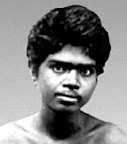

For more, see this.
The Guru is where one is
For those who say that God exists, He exists in their Heart as consciousness. But in the venomous mind (of those who do not believe in Him), He will never exist (never shine). If by purifying the venomous mind, one sees without delusion, He will shine triumphantly and unalloyed as Self.
-- GVK (1083)

The last words exchanged between Bhagavan and Sri Annamalai Swamy form a very moving account of how a guru attempts to break the discples attachment to his form. Some excerpts:
"If one has no faith in God one will commit a lot of sins and be miserable. But you, you are a mature devotee. When the mind has attained maturity, in that mature state, if one thinks that one is separate from God, one will fall into the same state as an atheist who has no belief in God."
I left the ashram and never went back again, Although my room is only about 200 yards from the ashram gate, I have not visited the ashram once since that fateful day in the 1940's.
Though Bhagavan has asked me not to come to the ashram any more, I still thought that I had the freedom to talk to Him when He visited Palakottu. Bhagavan disabused me of this notion shortly afterwards, when I went to see Him while He was walking on the hill.
He turned to me and said, "You are happier than I. What you had to give, you have given. What I had to give I have given. Why are you still coming to me?"
These were His last words to me. I obeyed his instructions and never approached Him again.
Bhagavan had once told me: "Do not cling to the form of the Guru for this will perish; do not cling to His feet for His attendants will stop you. The true Bhagavan resides in your Heart as your true Self. This is who I truly am."
When one group of villagers who had just been given Arunachala Stuti Panchakam (Five Hymns to Sri Arunachala) to recite left the hall, a devotee asked, ' How can such uneducated people understand the literary Tamil in these poems?'
'They don't have to understand the meaning,' replied Bhagavan, 'they will get some benefit from merely repeating the verses.'
On another occasion, with respect to Echammal's granddaughter, Bhagavan said, 'In future when trouble comes to her, the remembrance of these verses (Essence of Instruction) will help her.'
This girl is now an old woman. When I saw her a few months ago, she told me, 'The verses have stayed in my memory all my life, but it is only recently, by the grace of Bhagavan, that I have begun to understand their meaning.'
(Memories of Sri Annamalai Swamy)
Related:
Echamma (Sri Ramana Leela) and her passing away
Echamma (Letters from Sri Ramanashramam)

After all this talk Bhagavan drank a little water from his kamandalam and turning to his attendant enquired whether he had already drunk some water (i.e., after he returned to the hall about 3-30 P.M.). The attendant said `yes', and thereupon Bhagavan said he had forgotten it, and to make sure he drank some again.
He further added, almost in an unguarded moment, as he rarely gives expression to such experiences of his, that sometimes he does not even know whether it is morning, mid-day or evening and has to look at the clock and try to remember before he knows what time of day it is. On one occasion, he has told me that he scratched his skin, where there was eczema once, as we scratch during sleep. And once when I was concerned over some physical pain of his, he told me he feels that pain, i.e., it was a passing and faint experience like that in a dream. These are clues to the sort of life Bhagavan leads in our midst, seeming to act and move and feel as we do, but really living in a world of his own where the things we experience don't exist.
